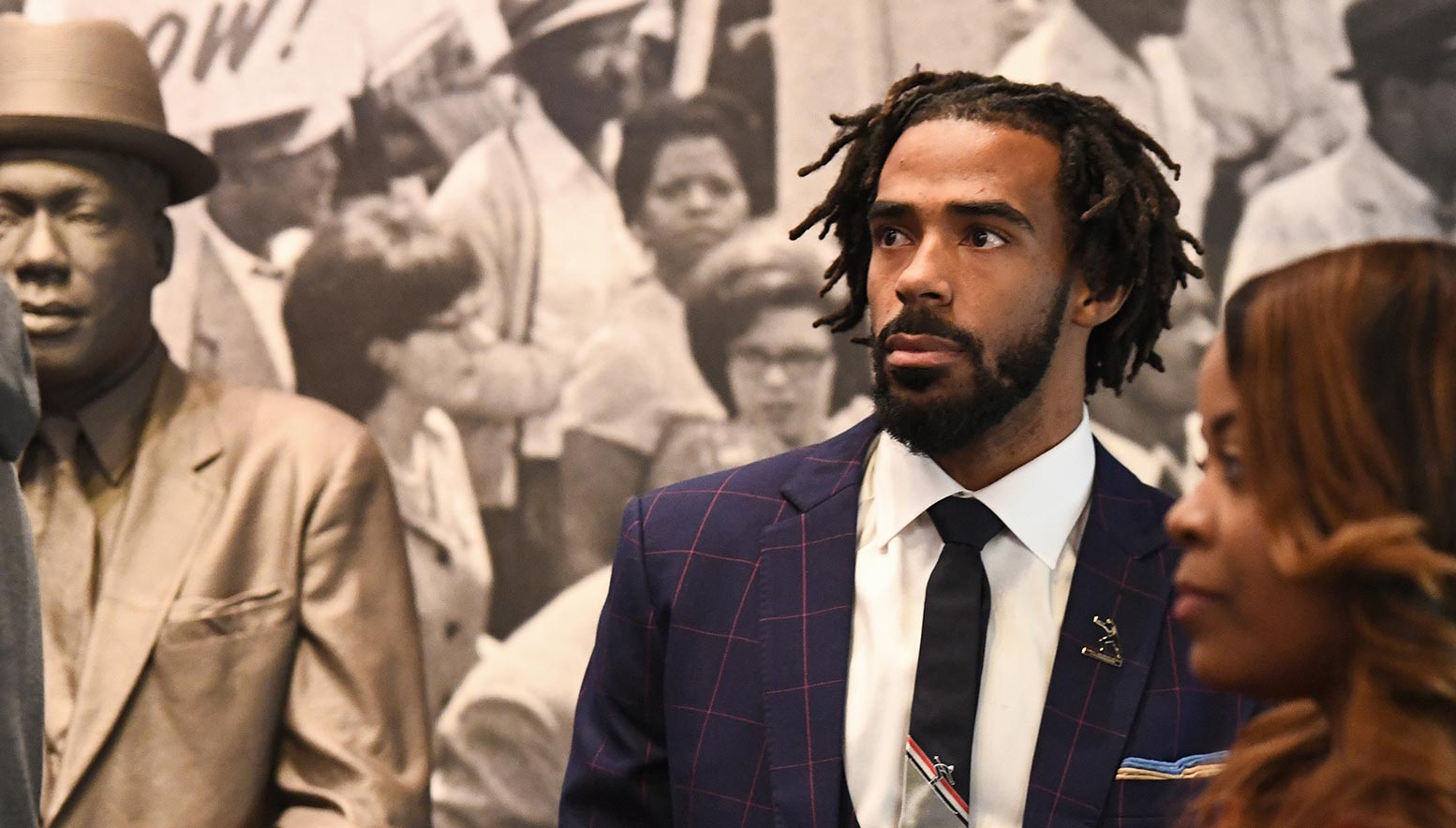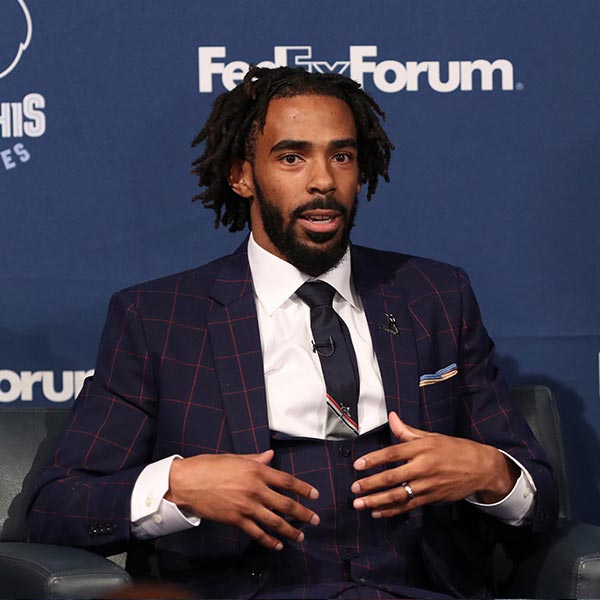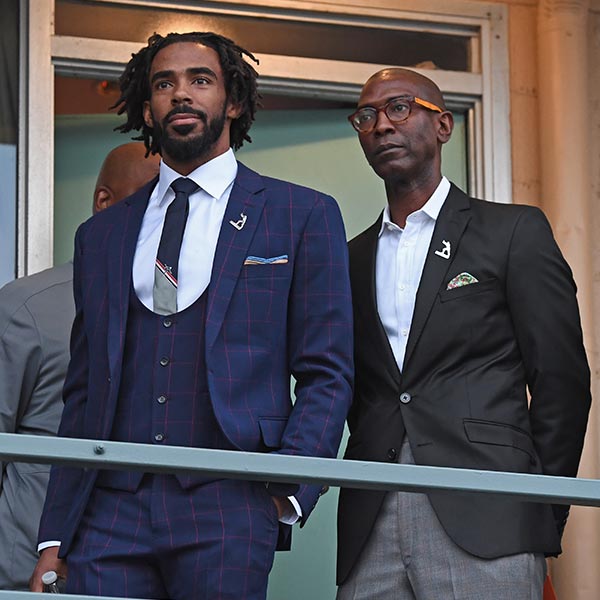
MikeCheck: Conley’s impact growing on, off court as Grizzlies celebrate MLK legacy and embrace national volunteer month
Michael WallaceMEMPHIS – The gigantic banner stretches 45 feet by 34 feet across nearly three stories of the office complex shared by the Memphis Rock ‘N Soul Museum and the Grizzlies administrative offices.
The banner, adjacent to FedExForum overlooking iconic Beale Street, features Mike Conley in his game-night uniform, leaning back and facing skyward, holding a basketball with his arms stretched wide open. He’s positioned alongside the slogan that reads in bold: GET MEMPHIS.
The image is absolutely fitting. It’s fitting, first, because it depicts Conley in total submission to his city. As the longest-tenured player with the Grizzlies, no one on the roster gets Memphis as a basketball town quite like the 12-year veteran playmaker who, on the court, has dished and dazzled the franchise through some of its most challenging lows as well as it highest peaks.
But it’s also vitally fitting because Conley gets Memphis now more than he ever has off the court, and all that comes with the responsibilities and opportunities as the highest-paid, highest-profile and most influential professional athlete in the city’s history. Despite the banner dimensions that literally cast his presence over Memphis, Conley isn’t caught up in being a larger-than-life figure.
He’s simply committed to impacting lives, particularly with social activism among the city’s youth.

Mike Conley #11 of the Memphis Grizzlies speaks at the MLK Sports Legacy Award on January 14, 2018 at the National Civil Rights Museum at the Lorraine Motel in Memphis, TN. Photo by Joe Murphy via Getty Images.
“To be able to hear their voices, opinions, their thoughts,” said Conley, 31. “I don’t think I was even remotely close to thinking about the things they’re thinking about, the social injustice they’re aware of and all of the things they’re trying to address and change. It’s unbelievable.”
Conley’s comments came after a panel discussion at Grizzlies Prep in downtown Memphis, where the Grizzlies’ catalyst joined Hall of Famer and NBA analyst Isiah Thomas and a group of the charter school’s fifth and sixth-graders. The topic was youth, social activism and the legacy of Dr. Martin Luther King Jr., who was assassinated at the Lorraine Motel in Memphis 51 years ago.
The school visit was among a slate of events the Grizzlies are involved with throughout January’s annual celebration of MLK Day and community service activities. The Grizzlies face the New Orleans Pelicans on Monday for the Jan. 21 17th Annual MLK Jr. Celebration Game on national television, and also present the 14th Annual National Civil Rights Museum Sports Legacy Award to NBA and WNBA greats Chris Bosh, Wayne Embry, Candace Parker and Bill Walton.
I don’t think I was even remotely close to thinking about the things they’re thinking about, the social injustice they’re aware of and all of the things they’re trying to address and change. It’s unbelievable.
Mike ConleyIt coincides with efforts to raise awareness for National Mentoring Month in January. And for Conley, this is the continuation of an increased commitment he pledged three years ago when he signed to remain with the Grizzlies on a five-year, $153 million contract that was the richest in NBA history at the time. Conley donated $1 million to the Memphis Grizzlies Foundation for service projects to aid at-risk kids in the Memphis community. The Grizzlies ownership group also matched his donation.
Since then, Conley has strengthened his voice, role and presence in addressing social issues such as police brutality, the Black Lives Matter movement and athletes using their platform to address systemic racism and other injustices. Memphis has ranked among the most distraught cities in the country in many education, economic and crime statistics, so there are plenty of challenges locally.
“All the work I’m able to be a part of through Grizzlies Prep, Code Crew, our mentoring programs and with the Grizzlies Foundation, they all go hand in hand because the kids are our future,” said Conley who is in the midst of his most productive seasons on and off the court. “Specifically toward mentoring, I want to try to provide these kids with a path to close the gap, to allow them to have equal opportunity as other kids in different areas and to be able to have success and make changes.”
The Grizzlies Prep students were selected for the panel with Conley and Thomas for successfully completing projects on historically famous activists, doctors and scientists such as Harriet Tubman, Vivien Thomas and Garrett Morgan. Prior to the panel discussion, the student scholars shared details of their research projects with Thomas and former NBA player Elliot Perry, a Grizzlies executive who works extensively with the Grizzlies Foundation and mentoring programs.
I want to try to provide these kids with a path to close the gap, to allow them to have equal opportunity as other kids in different areas and to be able to have success and make changes.
Mike ConleyThomas, who guided the Detroit Pistons on two NBA title runs in the late 1980s, said he’s known Conley since he was the same age as the five scholars who participated in the discussion that mid-January day. Conley, Thomas and Perry then rode in a van with the students to the National Civil Rights Museum at the Lorraine Motel and also to other MLK-inspired landmarks downtown.
“I’ve watched him grow since he was 10, 11-years old,” Thomas said of Conley, who was born in Arkansas and grew up in Indianapolis as the son of Hall of Fame track star Mike Conley Sr. “Reflecting and looking back and seeing the kids in the audience, you realize that Mike Conley was one of those kids at one time, with big eyes, a curious mind and didn’t know what the future held for him. Having the opportunity to see that kind of visual in front of me was refreshing and gave me hope that the next generation could get there. Not just to be an athlete, but to be the kind of man and person Mike is.”
Thomas was part of a Turner Sports film crew that was in Memphis to gather footage for a feature set to run during the NBA’s slate of MLK Day nationally televised TNT games. But retracing some of the steps King took in Memphis before his death forced some of Thomas’ personal memories to resurface as he grew up in Chicago during the height of civil rights unrest in the 1960s.
“MLK lived in my neighborhood when he moved to Chicago (in the late 60s) and my mother marched and was an activist,” Thomas said. “When she went to the marches, we went to the marches. We didn’t have nannies or babysitters. Growing up in Chicago, when (Black Panther Party activist) Fred Hampton was murdered, it was literally four or five blocks from my house.”
Thomas spoke stoically as recollections from his past continued.

Mike Conley #11 of the Memphis Grizzlies and Elliot Perry stand together on the balcony of the Lorraine Motel at the National Civil Rights Museum on January 14, 2018 in Memphis, TN. Photo by Garrett Ellwood via Getty Images.
“I was one of the kids that was part of the free breakfast program the Black Panthers started in Chicago,” he added. “When you talk about police brutality, equal rights, civil rights, voting rights … activism was what I knew. So when I got to the NBA, no one in my family or my neighborhood was surprised when I was speaking on race, class and gender.”
Perry, a Memphis native who played for the Tigers and the Grizzlies, has a similar experience. His grandfather was among the men who stood with the striking Memphis sanitation during the famous ‘I AM A MAN! March’ that attracted King to Memphis days before his death.
Perry has seen Conley gradually find his own voice over the years as he’s embraced his platform.
“He’s grown tremendously, even from just five years ago,” Perry said of Conley. “He was a guy who always did things, but he never wanted to talk about issues, he never wanted to be out front. A lot of that is his personality. But now you can see the maturation, you can see him start to take on issues that he wouldn’t talk about before, you start to see him more visible in the community and talking about the importance of things in terms of mentoring. He realizes somebody once poured into his life to get him to where he is, and he’s been instrumental for us in helping us get the word out about mentoring.”
Conley is grateful and eager to pour right back into the youth with outstretched arms.
Just like the image in his banner that oversees his city.
“I think everything I’m able to put my hands on in the city is geared toward the same goal,” Conley said. “And I’m just thankful to be put in a position to affect these kids’ lives in a positive way.”
The contents of this page have not been reviewed or endorsed by the Memphis Grizzlies. All opinions expressed by Michael Wallace are solely his own and do not reflect the opinions of the Memphis Grizzlies or its Basketball Operations staff, owners, parent companies, partners or sponsors. His sources are not known to the Memphis Grizzlies and he has no special access to information beyond the access and privileges that go along with being an NBA accredited member of the media.
Published on Jan 21, 2019
Related content
